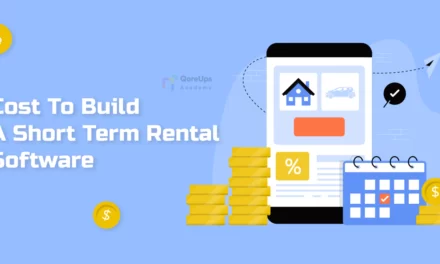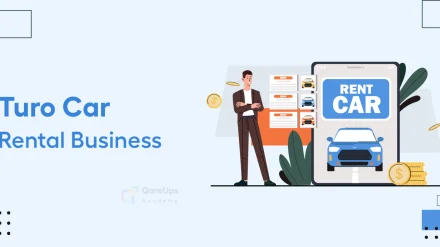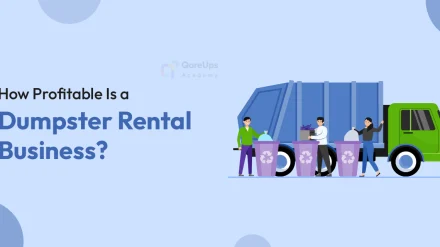Starting an equipment rental business is a dream for many entrepreneurs like you after witnessing its growth.
But, you may have many questions running inside your mind.
Is it profitable to start an equipment rental business in 2025?
Even if it is profitable, how to start an equipment rental business successfully.
That’s why we have compiled this blog.
We’ll explore the dynamics of starting an equipment rental business in 2025 and evaluating its profitability.
Equipment Rental Business – Overview
The equipment rental business involves providing customers with access to various tools, machinery, and equipment on a short-term or long-term rental basis.
This business model eliminates the need for customers to purchase expensive equipment outright, offering a cost-effective solution for industries like construction, landscaping, events, and home improvement.
The equipment rental business offers an excellent opportunity for entrepreneurs seeking a steady, scalable, and profitable venture in 2025 and beyond.
Starting Equipment Rental Business 2025 – Key Takeaways
- Growing Demand: Economic dynamics and cost-effectiveness drive increased demand for rental services across various industries.
- Sustainability: Renting equipment appeals to environmentally conscious consumers, reducing overall resource consumption and waste.
- Technological Integration: Advances in technology enhance efficiency, customer experience, and inventory management.
- Flexibility: Rental businesses can quickly adapt to market changes and diverse customer needs, ensuring resilience and growth.
- Customer-Centric Approach: Exceptional customer service fosters loyalty, positive referrals, and repeat business.
- Market Research: Understanding target markets, industry trends, and competitive landscapes is crucial for business viability.
- Comprehensive Planning: A detailed business plan covering objectives, strategies, and financial projections is essential.
- Proper Financing: Secure adequate funding through personal savings, loans, investors, or grants to cover startup and operational costs.
- Compliance: Ensure legal and regulatory compliance, including necessary licenses, permits, and insurance coverage.
- Marketing Strategies: Utilize digital marketing, social media, and partnerships to increase brand visibility and attract customers.
- Performance Monitoring: Regularly track key performance indicators and adapt business strategies based on data-driven insights.
Thus, starting an equipment rental business in 2025 offers significant potential for profitability with the right approach and execution.
Starting An Equipment Rental Business Profitable In 2025?
A huge yes!
Starting an equipment rental business will be profitable in 2025. Not believing?
Let’s look at the stats of the equipment rental business.
Market Growth Projections
- United States: The equipment rental industry is expected to see a growth of 5.7% in 2025, reaching a revenue of $82.6 billion.
- Canada: The Canadian equipment rental market is projected to grow by 6.7% in 2025, with revenues reaching $6.21 billion.
- Global Perspective: The global construction equipment rental market is anticipated to reach USD 141.42 billion in 2025, growing at a compound annual growth rate (CAGR) of 4.85% to reach USD 179.21 billion by 2030.
Market Dynamics
- Slower Growth: While the industry is still growing, the pace is slowing compared to previous years. For instance, the U.S. market saw an 8.2% increase in 2024, but growth is expected to decelerate to 5.7% in 2025.
- Regional Variations: In Canada, the growth rate is projected to ease from 7.6% in 2024 to 6.8% in 2025, influenced by factors such as the strength of the Canadian dollar and sector-specific demands.
Considerations for Entrepreneurs
- Market Saturation: The equipment rental market is becoming more competitive, with established players and new entrants vying for market share.
- Economic Factors: Interest rates, infrastructure spending, and economic policies can significantly impact the demand for rental equipment.
- Technological Advancements: Embracing new technologies, such as electric and battery-operated equipment, can provide a competitive edge.
However, these projections will come true based on certain factors. Let’s see them.

Factors That Make 2025 An Ideal Time To Invest In Equipment Rental Businesses
The equipment rental industry is witnessing robust growth, driven by several factors that make 2025 an ideal time to invest.
Market Demand and Growth Potential
The demand for equipment rentals spans various sectors, including construction, events, manufacturing, and logistics.
Businesses and individuals prefer renting equipment due to lower upfront costs, maintenance convenience, and the ability to access specialized machinery without long-term commitments.
As economies recover from global disruptions and infrastructure projects gain momentum in 2025, the need for construction equipment, tools, and machinery is expected to surge.
This trend ensures a steady stream of clientele and indicates sustained growth potential for rental businesses.
Cost Efficiency for Customers
Owning equipment entails significant costs, including purchase price, maintenance, storage, and depreciation.
In contrast, renting allows businesses to allocate capital more efficiently, focusing resources on core operations rather than tying them up in assets that may become obsolete or underutilized.
Moreover, renting enables customers to access state-of-the-art equipment and technology without bearing the full burden of ownership costs, making it an attractive option in a competitive market landscape.
Flexibility and Adaptability
One of the key advantages of equipment rental businesses is their flexibility.
They can quickly adapt to market demands by adjusting inventory, expanding into new sectors, or offering specialized equipment for niche markets.
This agility enhances customer satisfaction and optimizes revenue streams by tapping into diverse industry needs.
Technological Advancements
The integration of technology in equipment and rental management systems has streamlined operations, improved asset tracking, and enhanced customer service.
Innovations such as IoT-enabled devices for remote monitoring and predictive maintenance ensure that rented equipment operates efficiently, minimizing downtime and enhancing reliability.
Embracing these technological advancements not only differentiates rental businesses in a competitive market but also improves operational efficiency and customer retention.
Equipment Rental Business Startup Cost
Starting an equipment rental business can require a significant investment, but it can also be highly profitable.
The startup costs vary depending on several factors such as the type of equipment, location, and scale of your business.
Let’s a breakdown of the key startup costs involved in starting an equipment rental business:
Equipment Costs
Investing in equipment is one of the most significant expenditures for any rental business.
Costs range from $500 to $500,000, depending on the type, quantity, and scale of operations.
For example, basic party rental equipment may fall on the lower end, while heavy machinery for construction rentals can reach the higher spectrum.
Facility Costs
Storage and operational spaces are essential for maintaining inventory and ensuring smooth business operations.
Renting a facility can cost between $2,000 to $10,000 per month for smaller setups, with larger facilities or customized storage solutions increasing these costs.
Insurance
Protecting your fleet is crucial, and equipment insurance will vary depending on the value and type of equipment.
On average, expect to pay $5,000 to $15,000 per year for insurance, with more expensive equipment or specialized coverage pushing costs higher.
Licensing & Permits
Depending on local regulations, you’ll need various permits for your business and specific equipment.
Generally speaking, expenses vary from $50 to $2,000 every year, according to your region and type of business.
Equipment Rental Software Development
Efficient software is essential for managing reservations, inventory, and customer interactions.
- Custom Development: A custom rental management solution costs $30,000 to $300,000, depending on features.
- SaaS Platforms: Opting for a SaaS rental software builder like QMarket can cost $50 to $300 per month, offering affordability and scalability for startups.
Marketing & Branding
Building a strong brand and reaching customers require an upfront investment in marketing.
Setting up a professional website, running promotional campaigns, and creating a compelling brand identity can cost between $2,000 and $10,000 initially.
Staffing & Operational Costs
If you’re hiring staff for customer service, maintenance, or fleet management, wages can range from $25,000 to $75,000 per employee annually, depending on the role and experience.
Maintaining your equipment in good operating condition requires regular upkeep.
This can cost around $10,000 to $20,000 per year for a smaller fleet and may increase with larger fleets or older equipment.
Transportation Costs
Delivery vehicles, such as trucks or vans, are essential for many rental businesses.
Costs range from $20,000 to $60,000, depending on the type and number of vehicles.

How To Start A Profitable Equipment Rental Business?
Starting a profitable equipment rental business requires careful planning, market analysis, and strategic execution.
Have a look at a step-by-step guide to help you navigate this endeavor successfully.
Market Research and Analysis
Before launching into the equipment rental business, conducting thorough market research is essential.
Identify local demand, competitor analysis, and niche opportunities within specific industries such as construction, events, or agriculture.
Understanding customer needs and preferences will guide your inventory selection and marketing strategies.
Equipment Rental Business Plan Development
A comprehensive rental business plan serves as a roadmap for success.
Define your business objectives, target market segments, pricing strategies, and financial projections.
Outline your operational logistics, including inventory management, maintenance procedures, and customer service protocols.
A well-structured business plan not only attracts potential investors but also ensures you stay focused on your goals.
Legal and Regulatory Compliance
Navigate the legal landscape by registering your business, obtaining necessary licenses and permits, and ensuring compliance with industry regulations.
Also, consider liability insurance to protect your assets and mitigate risks associated with equipment usage.
Investment in Quality Equipment Rental Software
The cornerstone of any equipment rental business is its inventory.
One of the critical aspects of establishing a successful equipment rental business is investing in quality equipment rental software.
In today’s digital age, leveraging technology to streamline operations, enhance customer experience, and improve overall efficiency is not just an option but a necessity.
With the right software in place, your equipment rental business can thrive and achieve long-term success in 2025 and beyond.
Look for the software that has the following features.
Key Features to Look for in Rental Software
When choosing rental software, consider the following essential features to ensure it meets the needs of your business:
User-Friendly Online Booking System
- Easy-to-navigate online catalog with detailed equipment descriptions and images.
- Real-time availability checking and reservation system.
- Customer account management for tracking reservations and rental history.
Integration Capabilities
- Compatibility with other business systems, such as payment gateways, analytics, etc.
- API support for custom integrations and third-party applications.
Robust Reporting and Analytics
- Customizable dashboards for tracking key performance indicators (KPIs) to check your business performance.
- Detailed reports on equipment utilization, financial performance, and customer behavior.
- Predictive analytics for forecasting demand and optimizing inventory.
With these features, build the best equipment rental software.
Marketing and Branding Strategies
Establish a strong online presence through a user-friendly equipment rental website and active social media profiles.
Utilize digital marketing techniques such as search engine optimization (SEO), pay-per-click (PPC) advertising, and content marketing to enhance visibility and attract potential customers.
Build credibility through customer testimonials, case studies, and partnerships with industry influencers.
Customer Relationship Management
Prioritize exceptional customer service to foster long-term relationships and promote word-of-mouth referrals.
Implement an efficient booking and reservation system that offers flexibility and convenience to clients.
Regularly solicit feedback to assess satisfaction levels and pinpoint areas for improvement.
Financial Management and Scalability
Maintain meticulous financial records to monitor cash flow, track expenses, and assess profitability.
Explore financing options for equipment acquisition or expansion initiatives.
As your business grows, consider diversifying your rental offerings or expanding into new geographic markets to maximize revenue potential.

Conclusion
The equipment rental business landscape in 2025 is ripe with opportunities for profitability.
With growing demand driven by economic dynamics, cost-effectiveness, and sustainability, this sector promises steady growth and lucrative returns.
Entrepreneurs who meticulously plan their venture, understand market needs and leverage technology can create a robust foundation for their rental business.
Starting an equipment rental business in 2025 is not just about meeting immediate demand.
It’s about positioning yourself for sustainable growth and resilience in the face of future market shifts.
Best of luck to your equipment rental business!






